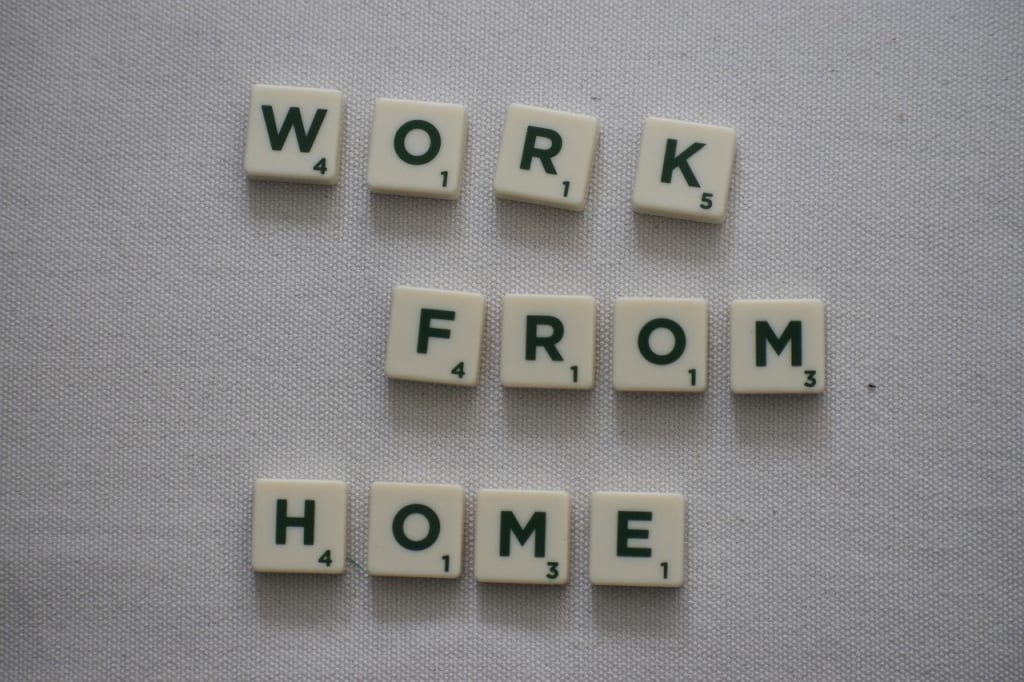How to cope with working from home
A Guide To Surviving Distractions and keeping a Work/Life Balance

Working from home: for me, it summons up two different images - one is of a ridiculously smart looking person in a shirt and tie typing on a laptop at their perfect home desk, working efficiently and without distraction...
The second image - you or I at our worst, hair sticking up, half asleep in our pyjamas, spooning cornflakes into our dribbling mouths, and trying to get up the motivation to stop endlessly browsing Facebook/Youtube/Vocal and DO SOME BLOODY WORK!
The first image: unrealistic. The second: not helpful either. Or practical. The key is to strike a balance of somewhere in between. I'm going to show you how, with 7 simple tips which will help you feel good about being at home, be much more efficient without becoming a robot, help you enjoy your non-working time, and ultimately strike up a good balance between the two. You won't need any special equipment to carry out these practices, just a bit of resourcefulness.
Let's be straight: we all need more harmony and less stress, especially in the midst of the current crisis. Many of us are now juggling work with families. We now can't just 'go out' or nip to a coffee shop to get a change of scene or get away from noisy kids, the way we did before the Coronavirus struck. It's also not practical to go spend a fortune on swish office equipment, in this uncertain age. Therefore we must find new ways to make it work, using the wartime 'make do and mend' mentality. We'll be all the more resourceful for it - so let's get stuck in!
Tip 1: CREATE A WORK SPACE
Unless your job is to get paid for watching telly and playing video games, you need a 'space' that's yours to work in. Simple really, but surprisingly effective, and ALWAYS the first major step you need to take in order to do any sort of work at home that requires space and concentration. Create a work space that's separate from your 'vegging out' space. Recreate an office space if you must, with a photo of your kids, a mini Zen garden, a nice plant; anything that feels conducive to being productive! You need to enjoy this space, AND get things done here. So find a way of having everything you may need to hand, whether it's improvising a pencil pot using an old plant pot (guilty) or blagging a comfortable office chair. It's your space: whatever works!
My sister had to work from home from short notice when the virus struck. She has a bad back so she blagged her ergonomically designed office chair from her office; but ingeniously made use of her ironing board to use as a 'desk' for her laptop!
Tip 2: WHEN THE BUZZER BEGINS, YOU BEGIN
I don't know about you, but I'm the world's biggest procrastinator. I'm always told I get lots done, but trust me, getting started is the hardest thing, especially as I have a touch of ADHD. Once I get 'in the zone' I'm pretty productive, but actually sitting down to DO the thing is hard because suddenly everything else I'm looking at is calling out to me for attention.
The key is to create task lists so that you know your key jobs you want to get done. Set a timer on your phone so that you get started on some work at a set time, and stop when the buzzer goes. Then you have a point of focus, without getting overwhelmed with jobs. Use Stephen Covey's famous management quadrant (from the classic personal development book The 7 Habits of Highly Effective People) - it sounds complicated but it's so simple. Once you've mastered this, you'll never struggle to prioritise again. I come back to this quadrant again and again, even for day to day tasks when things feel overwhelming. It basically involves drawing a cross on a piece of paper, so that you have four equal quadrants. Then in each quarter you write the following headings:
QUAD I.
Urgent AND important. (This will be crises basically, urgent deadlines, disasters, emergencies. We don't like these as they are stressful, and they take time away from the other three quads)
QUAD II.
Non urgent but important. (Planning, filing, admin, business development, building relationships, answering non-urgent emails. They need doing, just maybe not this second. It is however very important to focus here daily, to prevent non urgent tasks becoming crises and moving into the first quad)
QUAD III.
Urgent but not important. (Time pressured distractions sit here, such as certain phone calls that may interupt you but are not urgent)
QUAD IV.
Not important or urgent. (Anything else really; distractions, like filing your nails, hanging the washing, playing an online game, anything that doesn't add any value to your work)
The great thing about this quadrant is that it can be rustled up at any time to immediately prioritise your attention. You could make a big long list of jobs, then work them into the quad daily. The quad can be reviewed at any time, and tasks crossed off or moved as they change priority. An example: a client calls you and interrupts your flow, giving you a task to complete later. However it is not urgent so would go into Quad III whilst you are focussing on Quad II activities. However later, the client could call back again and notify you that the situation is now urgent and they need the task completing by the end of the day. So you would move this Quad III task into Quad I and now prioritise it so that it can be crossed off the list.
Try it now, on a scrap of paper, with whatever jobs come to mind! As you get better at this, your brain will start recognising whenever a task 'feels like' a Quad I! Quad II is where you want to be spending most of your time, if at all possible. Getting good at planning will reduce the sudden 'disasters' that show up and demand your attention.
Tip 3: REMOVE TEMPTING DISTRACTIONS
You know what those temptations are for you; a screen game, a magazine sat beside you that you pick up and leaf through, the washing up, that messy drawer that's dying to be decluttered... Remove them, put them out of sight, put your Facebook notifications to silent. Sit with your back to the washing up if need be. If you're in a busy house, shut yourself in a quiet room if you can, or place a 'Do Not Disturb' on the back of your chair!
If you're desperate to do this stuff, then plan it in as rewards for timed bursts of work! You can be free and flexible, as long as the work is getting done somehow!
Make Post-It notes your new best friend; this always worked for me having worked at home at various times, but also having a very active and creative brain that randomly throws ideas at me. Scribble good ideas down, but don't get immediately distracted by them. Plan them into your quad for later, or the next day.
Tip 4: HAVE PROPER BREAKS
Tea, coffee, juice, whatever floats your boat. Stay hydrated and motivated. Also, set a time for a lunch break and take a proper one! Get outside even if it's just with your coffee in the backyard. Inhale the air, get a change of scene. Go for lunch with a friend if you can (Coronavirus rules allowing of course). Or ring or Skype someone. Take a walk. Taking proper breaks away from the desk does wonders for productivity - we actually work better when we're refreshed, not stressed. We have our best ideas when we're staring out of a window or relaxed, not when we're stressing out over a difficult task or impending deadline. Have a stretch, eat something that will nourish you, get out of your chair, and move around.
Also, it's worth considering the importance of balancing things out according to what type of work do you. Does it tax mainly your body, or your brain? If your job is mentally intense and gives you headaches for example, then making extra sure that you get up, walk outside and get fresh air will give you that much needed break. Invest in eye drops for tired eyes; your corneas will thank you.
If your work is physically very strenuous, you may prefer to relax by vegging out to a film or book you can immerse your brain in.
Tip 5: ARE YOU A LARK OR AN OWL?
Figuring out when you're most productive is a great skill and can be brilliantly put to use at home, because you can, to some degree, work on your own terms. The much-loved business mentor Jim Rohn used to suggest scheduling your most mentally tiring tasks according to when you know you will be functioning best as a person, so that if you are half asleep in the mornings, set yourself your more gentle tasks earlier on, and schedule in taxing stuff later in the day. And vice versa - if you're an early bird go-getter, get lots done in the mornings! It is vitally important to make your breaks work for you. If you know you always have a brain-fog 'slump' around 11am and at 3pm (like most people; this is when our blood sugar levels naturally dip) make sure you have refreshing breaks at these times to perk yourself up.
Tip 6: DELAY GRATIFICATION
If we are VERY easily distracted, especially if we're trying to focus but are feeling anxious (not surprising at the moment) it can be necessary to reward ourselves for short bursts of work. Maybe that's how it needs to be whilst we build up our resistance to the temptations around us. On a very small scale, we might set a timer for twenty minutes work on a database for example, then allow ourselves five minutes on our favourite game. Work is rewarded with fun. But! We have to stick to this, so that the few minutes' game-playing doesn't become a major part of your working day.
Tip 7: PROTECT YOUR TIME
This may feel a bit like the tip about removing distractions, but it feels important enough to have its own space. What I mean by protecting your time is not only minimising your own immediate distractions, but also not allowing other people (if it is not appropriate or important) to disturb your focus. This may be a bored friend who likes to ring you up for chats without warning. There's nothing wrong with protecting your own time, so you may (for example) want to respond to your friend later, or drop them a quick text saying you'll ring them at such-and-such a time. You may even want to set up a new voicemail on your phone, specifying that you may be busy working and will get back to them asap. If they're a decent friend who respects boundaries, this won't be a problem. Of course things are very different if an immediate crisis comes up...
Good luck to everyone making their lives work in this new, unprecedented time, and hope you can make working at home work for you!
About the Creator
Karen Cave
A mum, a friend to many and I love to explore dark themes and taboos in my
Hope you enjoy! I appreciate all likes, comments - and please share if you'd like more people to see my work.






Comments
There are no comments for this story
Be the first to respond and start the conversation.